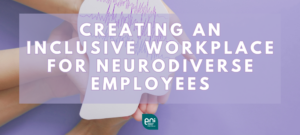Creating an Inclusive Workplace for Neurodiverse Employees
Neurodiverse individuals may need adjustments throughout the interview and onboarding, as well as long-term support in their role.
If you want to highlight their unique strengths and support them overcoming challenges, there are some key strategies we have listed that can create a more inclusive workplace for neurodiverse employees.
At the very initial stages (advertising the role), we recommend that you ask if any adjustments are needed – this doesn’t just apply to neurodiverse candidates and can help those with physical disabilities too.
During the Interview Process
- Be flexible with the interview method or channels you are using. Offer options such as phone calls, video interviews or face-to-face meetings and allow candidates to choose what best suits them.
- Provide clear instructions and agendas before the interview – this can help to reduce anxiety in candidates, and allows them to prepare properly for the interview, putting their best foot forward!
- Be considerate of overstimulation when it comes to the environment. Noise level, seating arrangements and lighting are just a few things we can think of that might be quite triggering for someone who is neurodiverse.
- Provide questions in advance, and where possible, focus on competency-based questioning that allows candidates to focus on experiences and skills, rather than trick or open-ended questions.
Onboarding
Now, here’s where you have to think about the long-term. Now the interview has passed, and you have a successful candidate, you’ve got to make sure your onboarding process is inclusive – this can set the tone for future employees.
- Put together an onboarding plan that’s tailored to the individual needs of neurodiverse employees. Find out how they best absorb information and structure their training material around that method.
- Another system we’ve seen have a positive impact is the mentorship/buddy-systems. Someone that can provide clear communication and support through training, the internal processes/procedures and just navigating their way around an office can help!
- Again, consider whether your office is sensory-friendly. Loud, messy, overly bright spaces can be really distracting or off-putting for someone who is neurodiverse.
- Make sure support is continuous and don’t shy away from feedback. Offer regular check-ins and be crystal clear on progress vs expectations.
Continued Support
If you want to retain employees, you have to support them continuously throughout their role. We’ve highlighted just a few things you can do to support employees beyond interview and onboarding.
- Come back to the point we made earlier about regular check-ins. Don’t lose sight of why you’re doing this at the onboarding stage, it’s just as important long-term! Use this opportunity to give more guidance support and recognition.
- Find out about their long-term career goals, and offer development opportunities based on that, that align with the businesses vision. Make them feel heard – it can be daunting taking that next step not knowing what support is available.
- Offer flexible working. Really… Structured days might not be the answer here, and whilst they work for a lot of people, they don’t work for all. Sometimes working in a quiet, familiar space can equal more productivity. Try to offer a more relaxed approach where possible for neurodiverse employees.
There’s plenty more you can implement or consider, and we’d be happy to chat through some pointers in more detail! Get in touch: hello@elizabethnorman.com or head back to our resources section for more support and tips. You can also follow us on LinkedIn to stay up to date with all our latest news/articles.
Looking to hire or want to discuss future growth plans? Get in touch with our expert consultants to discuss how we can support your short-term or long-term goals: hello@elizabethnorman.com

